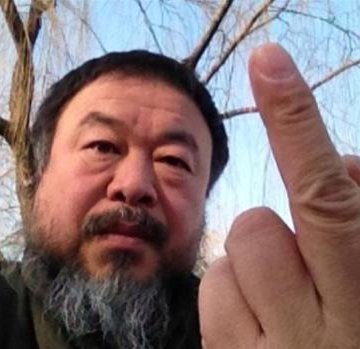- About
- Topics
- Picks
- Audio
- Story
- In-Depth
- Opinion
- News
- Donate
- Signup for our newsletterOur Editors' Best Picks.Send
Read, Debate: Engage.
| located: | Denmark |
|---|---|
| editor: | Vanessa Ellingham |
Prominent Chiense artist Ai Weiwei will withdraw from two exhibitions in Denmark in protest of the country's harsh new asylum law which was passed yesterday.
The new law makes it possible for refugees' valuables to be seized on arrival and will delay family reunifications for up to three years, a move which critics - including Kofi Annan and Ban Ki Moon - say will destroy families.
Ai Weiwei announced on social media that he will remove his works from ARoS Aarhus Art Museum and the Copenhagen gallery Faurschou Foundation, copying in a letter he sent to ARoS:
“I am very shocked about yesterday's news that the Danish government has decided to seize refugees' private property. As a result of this regrettable decision, I must withdraw from your exhibition ‘A New Dynasty.Created In China’ to express my protest of the Danish governments' decision. Please accept my regrets and thank you for your long-term support. I apologize for the inconvenience caused,” the artist wrote.
He also released a joint statement with the Faurschou Foundation in which the founder showed support for the boycott:
"This decision follows the Danish parliament’s approval of the law proposal that allows seizing valuables and delaying family reunions for asylum seekers. Jens Faurschou backs the artist’s decision and regrets that the Danish parliament choses to be in the forefront of symbolic and inhuman politics of todays biggest humanitarian crisis in Europe and the Middle East, instead of being in the forefront of a respectful European solution to solve the acute humanitarian crisis."
This is not Ai's first Danish controversy. In October Danish toy giant Lego refused his bulk order on the grounds that they do not sell to users with "political" intentions.
Ai criticized the company for gagging free speech and, after international debate, Lego changed its policy.
A well-known critic of the Chinese regime, Ai has been using his influence in the art and cultural worlds to draw attention to the refugee crisis in Europe, having moved to Berlin last year after his travel ban from China was lifted.
While much of his famous work critiques Chinese authority, he has lately turned his attention to his new home, clearly unafraid of questioning the systems which have allowed him to successfully make work outside his country of birth where he was stifled.
Ai regularly posts photos of refugee rescues in Lesbos, Greece to his Instagram account, where he is making a documentary about refugees arriving from the Middle East.
Gallery owner Faurschou says: “From Ai Weiwei’s side the important thing is to get a debate and to use his voice.
"He is becoming a European; he is taking part in what goes on here. He did that in China. People would say he has no influence, but when he focused on the scandal of the earthquake in 2008, today China is doing something about corruption. He has a voice and he uses it. I really admire him for that.”
The news that some German states, as well as Switzerland and historically the Netherlands have all legalised the seizing of refugees' valuables begs the question: will there soon be anywhere left for Ai Weiwei to display his art?
